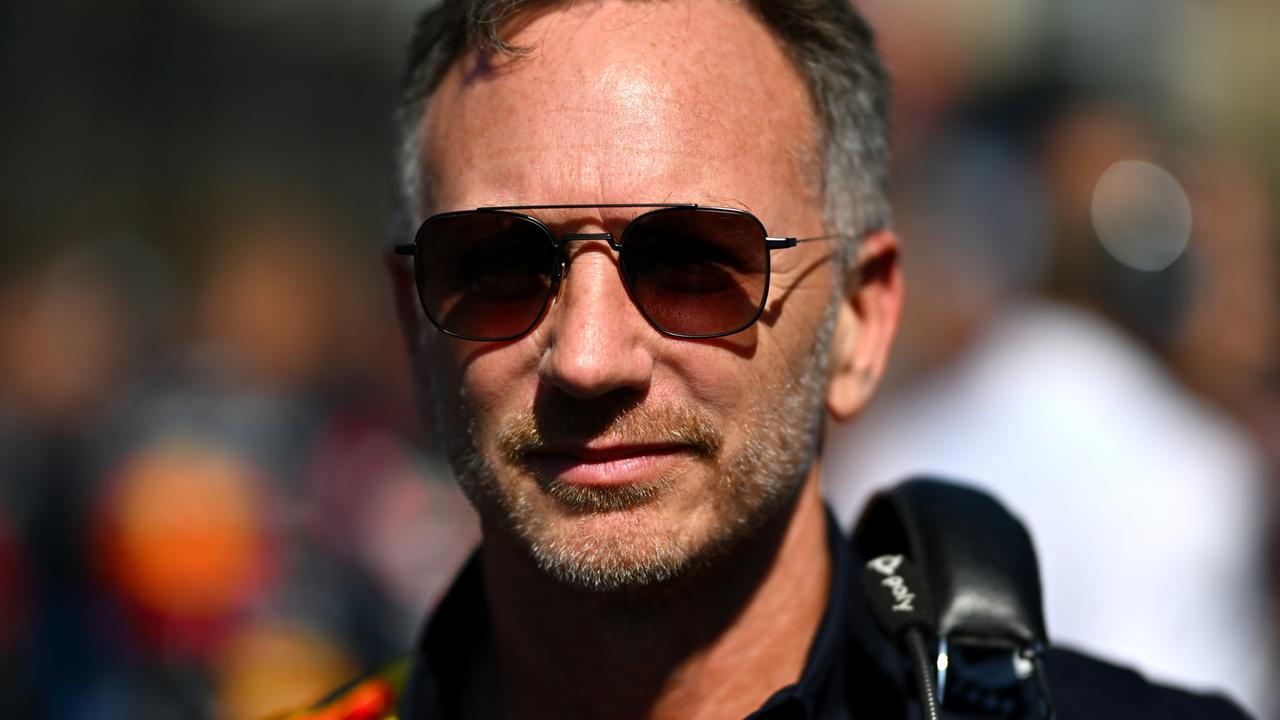Sacked Red Bull Racing principal Christian Horner will be allowed to join another Formula 1 team as soon as next year after accepting a multimillion-dollar payout from the energy drinks giant.
Horner was axed in a July boardroom coup, but the title-winning team boss remained on the payroll as negotiations continued over termination of his contract, which ran until 2030.
Red Bull Racing announced this week that Horner has now formally left the team, with reports suggesting he accepted a US$100 million (A$151.6 million) pay-off.
Fox Sports, available on Kayo Sports, is the only place to watch every practice, qualifying session and race in the 2025 FIA Formula One World Championship™ LIVE in 4K. New to Kayo? Join now and get your first month for just $1.
The Englishman was reportedly on a yearly salary of £8.92 (A$18.25 million) in 2023, when the team won all but one race on the way to a dominant drivers-constructors title double. That figure would have increased in the years since, and he would also have had his pay topped by performance bonuses.
Reports further suggest that Horner will be free to join a rival team as early as the second quarter of 2026.

He was rumoured to have been approached by Ferrari in the months before his sacking, but the Italian team has since extended Frédéric Vasseur’s contract until at least the end of 2027.
Speculation has also connected him to the purchase of a stake in the struggling Alpine team, though no concrete links have emerged since his axing in July.
“Leading Red Bull Racing has been an honour and privilege,” he said in a statement. “When we started in 2005, none of us could have imagined the journey ahead — the championships, the races, the people, the memories.
“I’m incredibly proud of what we achieved as a team, breaking records and reaching heights no-one would ever believe were possible, and I will forever carry that with me.
“However, for me my biggest satisfaction has been assembling and leading the most amazing group of talented and driven individuals and seeing them flourish as a subsidiary of an energy drinks company and seeing them take on and beat some of the biggest automotive brands in the world.
“I wish Laurent [Mekies, new team boss], Max [Verstappen], Yuki [Tsunoda] and all of the Red Bull Technology Group the very best for the future.
“I am confident they will, as ever, deliver success on the track for our fans and continue to push to the maximum, and I look forward to seeing the first Red Bull-Ford engine in the back of RB22 next year as well as the exciting RB17 [hypercar].
“I would like to thank our incredible sponsors and partners for their unwavering support who have played a key role in all our success. I would like to say a big thank you to the fans for their ongoing belief and without whom there would be no Formula 1.
“Racing aside, I would also like to thank the shareholders: the late Dietrich Mateschitz for the opportunity he gave me as a 31-year-old, Mark Mateschitz and Saravoot Yoovidyha and finally Chalerm and Daranee Yoovidhya for their friendship and commitment during my time at Red Bull as well as Oliver Mintzlaff and the board for their guidance.”
Red Bull corporate projects and investments CEO Oliver Mintzlaff, who is believed to have been a driving force in Horner’s ousting, paid credit to the team’s foundation boss.
“We would like to thank Christian for his exceptional work over the last 20 years,” he said in a statement. “With his tireless commitment, experience, expertise and innovative thinking, he has been instrumental in establishing Red Bull Racing as one of the most successful and attractive teams in Formula 1.
“Thank you for everything, Christian, and you will forever remain an important part of our team history.”
Max claims Azerbaijan as Piastri crashes | 02:20
HORNER’S FUTURE IS UNCLEAR
In a cruel irony, Horner had declared his “commitment, 100 per cent” to Red Bull Racing just six weeks before he was blindsided by the board.
At only 51 years old, it seems unlikely that Formula 1 has seen the last of Horner, and reports suggest that he won his freedom to join a rival team before the middle of next year as part of negotiations over the cancellation of his contract.
The long-time team boss’s statistics are unimpeachable, with the Briton one of the most successful principals in the history of Formula 1.
Only three team principals have accumulated more than his 14 world titles: Ron Dennis (McLaren, 17 titles), Frank Williams (Williams, 16 titles) and Toto Wolff (Mercedes, 15 titles).
Red Bull Racing’s 124 wins during his time at the helm similarly rank him among the all-time great Formula 1 managers.
Team principals by victory rate
1. Toto Wolff (Mercedes): 47.76 per cent (117 wins from 245 starts)
2. Jean Todt (Ferrari): 38.49 per cent (97 wins from 252 starts)
3. Christian Horner (Red Bull Racing): 30.62 per cent (124 wins from 405 starts)
4. Ron Dennis (McLaren): 29.98 per cent (137 wins from 457 starts)
5. Colin Chapman (Lotus): 23,92 per cent (72 wins from 301 starts)
6. Frank Williams (Williams): 18.30 per cent (114 wins from 623 starts)
He’s also one of modern Formula 1’s most recognisable characters, with his notoriety supercharged by his appearances in the Drive to Survive television series, in which he happily played chief agitator.
“Christian was one of those protagonists,” Mercedes boss Toto Wolff said. “He was outspoken, he was controversial, he was an arse, and he loved to play that role. You need an arsehole; people need to hate someone.
“Am I missing him? It’s quite strange to come here and Christian’s not going to be around. I mean, what are you doing with him not around? That’s a bit weird.
“Even your biggest enemy is your best friend.”
But the fizzling out of his Red Bull Racing tenure will leave some prospective hirers with concerns.
The workplace scandal for which he was internally twice cleared still hangs over him, with a UK Employment Tribunal hearing of the matter set down for January.
Any decision about his future is likely to be delayed until at least then.
His centralised style is also at odds with the increasingly corporate world of Formula 1, in which only one owner-operator remains: Toto Wolff, who owns a one-third share in the Mercedes team.
Horner’s refusal to cede any control over Red Bull Racing reportedly played a role in convincing the team’s Austrian owners to cut the cord
If he were to return to Formula 1 in a hands-on capacity, he would surely aim to do so with skin in the game as shareholder. Not only is it the logical next step from his already glowing list of sporting achievements, but it would safeguard him from meeting the same fate twice.
That theory has connected him to Alpine. Despite frequent denials that it’s for sale, rumours that the Renault-owned British-based team is on the market refuse to disappear.
The BBC reported earlier this year that Renault is open to selling around a 20 per cent stake in the team.
Alpine was valued at $1.36 billion after group of investors that included American actor Ryan Reynolds purchased a 24 per cent stake. Some estimates place its 2025 value at more than $2 billion.
But the Englishman won’t be in a rush to settle on his next chapter. With sweeping regulation changes coming into force next season, he will likely appraise the competitive order before choosing his next direction.
Vamos! Sainz ECSTATIC with podium result | 01:03
THE RISE AND FALL OF CHRISTIAN HORNER
Horner had been the longest serving team principal in the paddock when he was sacked, having joined Red Bull Racing in its foundation 2005 season.
He immediately made waves by poaching famed designer Adrian Newey from grandee McLaren.
Newey, whose shock exit from Red Bull Racing last year precipitated its decline and Horner’s eventual ousting, began work in 2006, and by 2007 the team was up from seventh to fifth in the constructors championship.
The Newey-designed 2008 Toro Rosso car won the brand’s first race at that year’s Italian Grand Prix, and Red Bull Racing claimed its maiden victory in China the following season.
Red Bull Racing won its first constructors championship in 2009, while star driver Sebastian Vettel claimed it first drivers crown in that year’s season finale in Abu Dhabi, beating teammate Mark Webber and two-time champion Fernando Alonso to the prize.
Together team and driver would claim four title doubles back to back.
But the competitive wilderness beckoned with changing regulations in 2014 when Renault, which had powered the team to all its titles, struggled with the new turbo-hybrid formula.
It took until 2019 for Milton Keynes to return to form, switching Renault for Honda in a partnership that would power Verstappen to his first world title in 2021, and the Dutchman and the team claimed the championship double in 2022.
Red Bull Racing hit its peak in 2023, when it won every race but one in the most one-sided campaign in Formula 1 history, setting records for most wins in a season (22), highest percentage wins in a season (95.5 per cent) and most consecutive victories in a season (14).
But though Verstappen won his fourth title in 2024, the team slumped to third in the constructors championship as its inability to find a competitive teammate for Verstappen began to sting.
Sergio Pérez, whom Horner re-signed earlier that year on a multi-year deal, was sacked in December. His replacement, Liam Lawson, was dropped after just two races. Yuki Tsunoda continues to toil in the car.
The team itself also began to labour just as it should have been revelling in its new era. Its cars became increasingly compromised to the point even Verstappen couldn’t drive around their peculiarities, and the team lost numerous key personnel to rival constructors
Newey’s departure to join Aston Martin was the highest profile. Jonathan Wheatley quit to become the Sauber/Audi team principal. Chief strategist Will Courtenay will leave to become McLaren’s sporting director. They followed chief designer Rob Marshall, who quit in 2023 to join McLaren.
Horner’s centralised leadership found itself in the spotlight as the team appeared to fall apart around him.
The Briton had been able to concentrate power for Red Bull’s sprawling F1 program in his hands, with oversight of its new powertrains division as well as junior team Racing Bulls. He was as intimately involved in the team’s commercial and marketing program as he was its racing and trackside operations.
His desire to take control put him on one side of a titanic power struggle with Red Bull motorsport adviser Helmut Marko in the wake of the death of company founder Dietrich Mateschitz.
On-track success ensured Horner retained the upper hand, but his grip was slackened significantly by a damaging workplace scandal early last year, in which he was accused of inappropriate behaviour by a female employee.
He was twice cleared by Red Bull internal investigations, after which Verstappen’s father, Jos, took the internecine conflict into the open in a bid to dislodge Horner from his post.
The loss of faith of the Verstappen camp was a significant blow, and when the team’s results began to dive this season, he found himself without a shield in the final powerplay that unseated him halfway through his 21st campaign at the helm.

